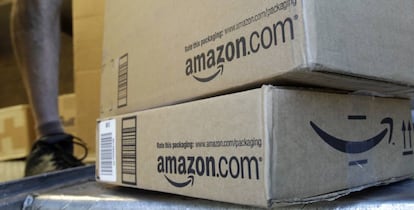Amazon seized more than seven million counterfeit products in 2023
The e-commerce platform detected 700,000 attempts to create fraudulent accounts

Amazon’s battle against counterfeits on the platform ended last year with the identification and seizure of seven million products worldwide, one million more than in 2022, according to company data, which detected 700,000 attempts to create new fraudulent accounts, compared to six million attempts in 2020, when the company launched an anti-counterfeiting unit to address the problem.
In its Brand Protection Report, published on Tuesday, the e-commerce company states that since the creation of the Amazon Anti-Counterfeiting Crimes Unit (CCU) it has pursued more than 21,000 bad actors through litigation and criminal referrals to law enforcement. “In 2023, Amazon strengthened its cross-border anti-counterfeiting collaboration with brands and Chinese law enforcement, which led to more than 50 successful raid actions with more than 100 bad actors identified and detained for questioning, many of whom are manufacturers, suppliers, or upstream distributors of counterfeit products,” Dharmesh Mehta, Amazon vice president, states in the document.
Amazon explains that its anti-fraud team is made up of 15,000 employees (including software developers, machine learning scientists and researchers) and invested around $1.2 billion in the project in 2023. The company believes that these efforts are having a deterrent effect: last year, Amazon detected 700,000 attempts to create an account to sell fake products, compared to 800,000 in 2022, 2.5 million attempts in 2021 and six million in 2020.
The proliferation of counterfeits in online shopping platforms not only creates distrust among buyers, it also exposes technology companies to the risk of being held accountable for possible crimes committed on their websites. In the case of Amazon, the problem is closely linked to the decision to open the platform to third-party sellers (they account for 58% of the products sold). Amazon has chosen to increase collaboration with brands and claims that in 2023, infringement complaints fell by 30%.
Fake reviews
Fake reviews are another problem, and Amazon is using technological tools to stop them from spreading. In recent years, an illicit industry has emerged that takes advantage of the value that reviews bring to consumers. These offenders target customers directly through websites, social media channels and messaging services outside of Amazon, asking them to write fake reviews in exchange for money, free products, or other incentives.
One of the latest actions was announced in March. Amazon filed a lawsuit against the administrators of a Telegram group, which operated under the name “Free Products” and promoted fake reviews from Spain. Spain’s consumer watchdog OCU also sent a request to Telegram, which has now closed this group. Its administrators used the encrypted instant messaging service to avoid detection and guaranteed group members a full refund of the products if they presented proof that they had posted a five-star review in the Amazon store in Spain.
Sign up for our weekly newsletter to get more English-language news coverage from EL PAÍS USA Edition
Tu suscripción se está usando en otro dispositivo
¿Quieres añadir otro usuario a tu suscripción?
Si continúas leyendo en este dispositivo, no se podrá leer en el otro.
FlechaTu suscripción se está usando en otro dispositivo y solo puedes acceder a EL PAÍS desde un dispositivo a la vez.
Si quieres compartir tu cuenta, cambia tu suscripción a la modalidad Premium, así podrás añadir otro usuario. Cada uno accederá con su propia cuenta de email, lo que os permitirá personalizar vuestra experiencia en EL PAÍS.
¿Tienes una suscripción de empresa? Accede aquí para contratar más cuentas.
En el caso de no saber quién está usando tu cuenta, te recomendamos cambiar tu contraseña aquí.
Si decides continuar compartiendo tu cuenta, este mensaje se mostrará en tu dispositivo y en el de la otra persona que está usando tu cuenta de forma indefinida, afectando a tu experiencia de lectura. Puedes consultar aquí los términos y condiciones de la suscripción digital.









































